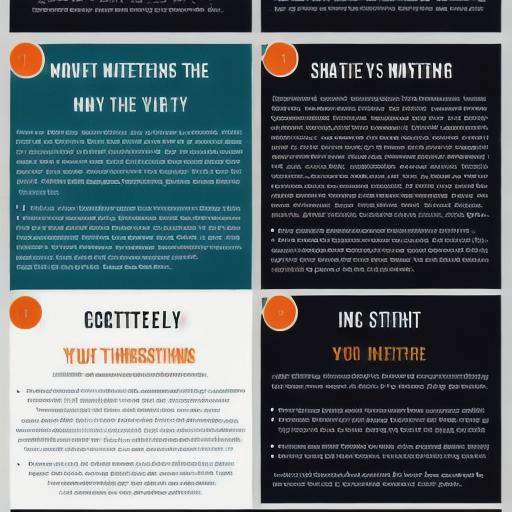Introduction
In today’s fast-paced, hyper-connected world, marketing has become an essential tool for businesses of all sizes to reach their target audience, build brand awareness, and ultimately drive revenue growth. However, with so much noise in the marketplace, it can be challenging for companies to stand out and achieve their marketing objectives. That’s why it’s crucial to understand the fundamental components of successful marketing strategies and how to apply them effectively to your business.
In this comprehensive guide, we will explore the key elements of successful marketing strategies, including market research, branding, content creation, social media marketing, search engine optimization (SEO), email marketing, paid advertising, event marketing, and influencer marketing. We’ll also examine real-life examples and case studies to illustrate how these strategies can be used successfully in different industries and by businesses of all sizes.
Market Research: The Foundation of Successful Marketing Strategies
Before you can develop an effective marketing strategy, you need to understand your target audience, competitors, and the market landscape. Market research is the process of gathering data and insights about these factors and using them to inform your marketing decisions.
There are various types of market research, including surveys, focus groups, online analytics, social media monitoring, competitive analysis, and industry reports. By conducting this research, you can gain valuable insights into your customers’ preferences, pain points, and buying behavior, as well as understand how your competitors are positioning themselves in the market and identify emerging trends.
For example, a company that sells fitness gear might conduct online surveys to understand its target audience’s workout habits, preferences for different types of equipment, and price sensitivity. They might also analyze social media activity to see what types of content resonate with their followers and how they can improve their engagement rates.
Branding: Building a Strong Identity that Connects with Customers
Your brand is the way your customers perceive and interact with your business. It’s more than just a logo or tagline; it’s a set of values, attitudes, and behaviors that define who you are and what you stand for.
A strong brand identity can help differentiate your business from competitors, increase customer loyalty, and create a positive emotional connection with your audience. To build a strong brand, you need to start by defining your brand’s core purpose, values, and personality traits. You should also develop a consistent visual style guide that includes colors, fonts, logos, and other design elements.
For instance, Nike is one of the most recognizable brands in the world, with a strong identity that focuses on athleticism, innovation, and inclusivity. Their "Just Do It" slogan has become synonymous with empowering individuals to take action and pursue their goals.
Content Creation: Educating, Entertaining, and Engaging Your Audience
Content creation is the process of creating valuable, relevant, and engaging content that educates, entertains, and informs your target audience. This can include blog posts, videos, infographics, whitepapers, ebooks, and social media posts.
The key to successful content creation is to understand your audience’s needs, interests, and pain points, and create content that addresses them in a meaningful way. You should also use storytelling techniques to make your content more engaging and memorable, and incorporate visual elements such as images, videos, and infographics to enhance your message.
For example, HubSpot is one of the leading content marketing software companies, with a blog that provides valuable insights and tips for marketers and small business owners. Their content strategy has helped them build a loyal following and establish themselves as thought leaders in the industry.
Social Media Marketing: Building Relationships with Your Customers
Social media has become an essential tool for businesses to reach their target audience, engage with customers, and build brand awareness. With over 4.2 billion active social media users worldwide, social media platforms like Facebook, Twitter, Instagram, and LinkedIn offer a vast potential audience for your business.
To be successful on social media, you need to create a content strategy that resonates with your target audience, engage with them through comments, messages, and shares, and use paid advertising to reach new audiences. You should also monitor social media activity and respond quickly to any negative feedback or issues that arise.
For instance, Zappos is one of the most successful online shoe retailers, with a strong social media presence that includes regular updates on their blog, Instagram, and Twitter accounts. Their social media strategy has helped them build a loyal following and create a positive brand image.
Search Engine Optimization (SEO): Improving Your Visibility in Search Engines
Search engine optimization (SEO) is the process of optimizing your website and its content to improve your visibility in search engines like Google, Bing, and Yahoo. With over 91% of online traffic driven by search engines, SEO is a critical component of any marketing strategy.

To optimize your website for search engines, you need to conduct keyword research to identify the phrases and terms that your target audience uses when searching for products or services like yours. You should also create high-quality, relevant, and engaging content that includes these keywords in a natural and meaningful way, as well as use meta tags, headings, and other on-page optimization techniques to improve your website’s visibility and relevance.

For example, Moz is one of the leading SEO software companies, with a blog that provides valuable insights and tips for marketers and small business owners. Their SEO strategy has helped them rank highly in search engines and establish themselves as thought leaders in the industry.
Email Marketing: Building Relationships with Your Customers
Email marketing is one of the most effective ways to reach out to your target audience and engage with them on a personal level. With over 3.7 billion email users worldwide, email marketing offers a vast potential audience for your business.
To be successful with email marketing, you need to build an email list of subscribers who have opted in to receive your communications, create valuable and engaging content that resonates with your target audience, and use personalization techniques to make your emails more relevant and effective.
For instance, Dollar Shave Club is one of the most successful subscription-based companies, with a strong email marketing strategy that includes regular updates, promotions, and exclusive offers for their subscribers. Their email marketing has helped them build a loyal following and create a positive brand image.
Paid Advertising: Reaching New Audiences through Online Ads
Paid advertising is one of the most effective ways to reach new audiences and drive traffic to your website. With various ad formats, placements, and targeting options, paid advertising allows you to reach specific demographics, interests, and behaviors that are most likely to convert into customers.
To be successful with paid advertising, you need to set clear goals and objectives for your campaigns, create compelling ad copy and visuals that resonate with your target audience, and use targeting options like location, interests, behavior, and lookalike audiences to reach the right people.
For example, Dropbox is one of the most successful cloud storage companies, with a strong paid advertising strategy that includes regular updates on their blog, social media accounts, and targeted online ads. Their paid advertising has helped them reach new audiences and drive traffic to their website.
Event Marketing: Creating Unforgettable Experiences for Your Customers
Event marketing is one of the most effective ways to engage with your target audience and create memorable experiences that they will never forget. With various event formats, such as webinars, conferences, meetups, and product launches, event marketing allows you to connect with your customers on a personal level and build brand loyalty.
To be successful with event marketing, you need to set clear goals and objectives for your events, create compelling content and experiences that resonate with your target audience, and use social media and other channels to promote your events and drive attendance.
For instance, Airbnb is one of the most successful vacation rental companies, with a strong event marketing strategy that includes regular updates on their blog, social media accounts, and curated travel experiences for their customers. Their event marketing has helped them create a loyal following and establish themselves as thought leaders in the travel industry.
Conclusion: The Power of Marketing Strategies
Marketing strategies are essential tools for businesses to reach their target audience, engage with customers, and drive sales. By understanding your target audience’s needs, interests, and pain points, and using various marketing channels and techniques, you can create effective marketing campaigns that resonate with your customers and achieve your business goals.




